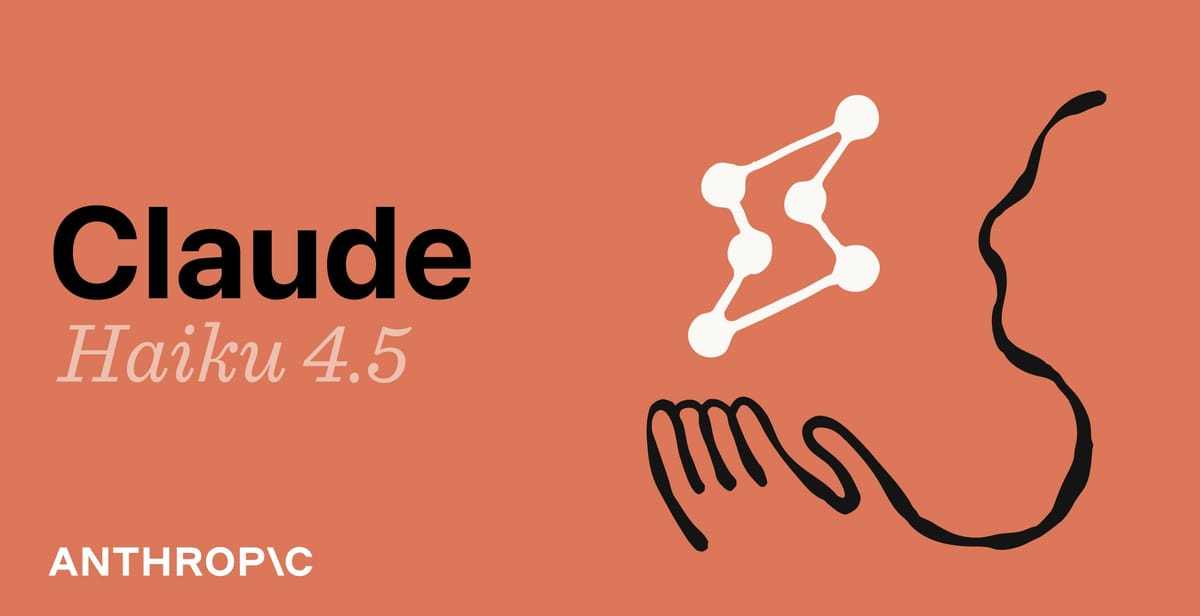
Anthropic released Claude Haiku 4.5 on Wednesday, positioning its smallest model as offering coding performance comparable to Claude Sonnet 4—which was state-of-the-art just five months ago—at one-third the cost and more than twice the speed. The release marks an unusual strategic move: Anthropic is making Haiku 4.5 available to all free users on its Claude.ai platform, effectively democratizing access to what it characterizes as near-frontier-level intelligence.
Key Points
- Claude Haiku 4.5 scores 73.3% on SWE-bench Verified, matching models like GPT-5 and Gemini 2.5 Pro while costing $1/$5 per million input/output tokens—roughly one-third the price of Sonnet 4.
- The model demonstrates lower measured misalignment rates than both Claude Sonnet 4.5 and Opus 4.1, earning an ASL-2 safety classification rather than the more restrictive ASL-3 designation applied to Anthropic's larger models.
- The release comes just two weeks after Claude Sonnet 4.5 launched in September and two months after Opus 4.1.
On the SWE-bench Verified benchmark, which evaluates models on real-world software engineering tasks, Haiku 4.5 scored 73.3%, slightly outperforming Sonnet 4's 72.7% and Google's Gemini 2.5 Pro at 67.2%. The performance extends beyond raw benchmarks. In certain specialized tasks like computer use—which involves GUI and browser manipulation—Haiku 4.5 actually surpasses its more expensive predecessor.
The economics tell a compelling story about AI's commoditization curve. While OpenAI's GPT-5 API costs $1.25 per million input tokens and Anthropic's Claude Opus 4.1 starts at $15 per million input tokens, Haiku 4.5 slots in at just $1 per million input tokens. For developers building high-volume applications or powering free-tier products, the math becomes straightforward.
Anthropic envisions a distributed architecture where its models work in concert. The company suggests Claude Sonnet 4.5 can create multi-step plans to solve complex problems while Claude Haiku 4.5 completes subtasks within those plans, with the models running in parallel for businesses tackling longer-term projects. This orchestration pattern—higher-level reasoning delegating to fast, cost-effective execution—represents a shift from monolithic to distributed AI workflows.
Haiku 4.5 is the first model in Anthropic's Haiku class to support extended thinking mode, sports a 200,000 token context window, allows 64,000 maximum output (up from just 8,192 for Haiku 3.5), and has a knowledge cutoff of February 2025.
Safety evaluations reveal an interesting profile. Anthropic classified Haiku 4.5 under its AI Safety Level 2 standard, compared to the more restrictive ASL-3 designation for Sonnet 4.5 and Opus 4.1, based on evaluations showing the model poses limited risks in producing chemical, biological, radiological, and nuclear weapons. In automated alignment assessments, it showed a statistically significantly lower overall rate of misaligned behaviors than both larger models, making it, by this metric, Anthropic's safest model yet.
The rapid release cadence tells its own story. Anthropic serves more than 300,000 business customers and its annual revenue run rate is approaching $7 billion, though the company faces stiff competition from OpenAI and Google. The breakneck pace of the industry doesn't afford Anthropic much time to get comfortable after a launch—while carrying out training for Claude Sonnet 4.5, the company had already kicked off work on Haiku 4.5.
Early enterprise response has been positive. GitHub integrated Claude Haiku 4.5 into Copilot for Pro, Pro+, Business, and Enterprise plans, with the rollout proceeding gradually. Shopify engineers and developers at companies like Zencoder have praised the model's speed, with some reporting Haiku 4.5 runs four to five times faster than Sonnet 4.5.
The strategic calculus extends beyond pure technical merit. By offering near-frontier capabilities at commodity pricing and making them freely available to all users, Anthropic is challenging the assumption that cutting-edge AI must command premium rates. What was state-of-the-art just five months ago is now faster, cheaper, and more accessible, as an Anthropic spokesperson emphasized.
Anthropic is working to release another model, likely an updated version of Opus, by the end of this year or early next year. The company's shipping velocity suggests the current frontier will soon become the new baseline—and what feels cutting-edge today will be table stakes tomorrow.

